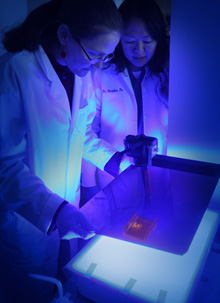
There are several mechanisms a student can use to pursue graduate work in our group. Regardless of the pathway, contact Dr. Criscitiello early to discuss possible projects and funding. Also inquire with the particular program for the formal application process. Competitive thesis and dissertation applicants need a 310/4.5 on the GRE, strong science background with >3.4 in science classes, research experience and an interest in molecular immunology, comparative immunogenetics and bioinformatics. If you think you can improve your GRE score to 320 or above you should do so… it will make many things easier.
The College of Veterinary Medicine & Biomedical Sciences confers both thesis M.S. and Ph.D. degrees in Biomedical Sciences.
Mike is in the Department of Veterinary Pathobiology but has a joint appointment in the department of Microbial Pathogenesis and Immunology, so a Ph.D. can be pursued through the Medical Sciences graduate program of the Texas A&M Health Science Center’s School of Medicine.
Dr. Criscitiello is a member of the interdisciplinary Ph.D. degree-granting Faculty of Genetics.
The Professional Program in Biotechnology hones bench prowess with business accumen, and a non-thesis M.S. can be taken with lab work in our group.
And, Mike is in the Interdisciplinary Faculty of Toxicology, through which a Ph.D. may also be pursued.
We are excited that the Texas A&M Interdisciplinary Program in Ecology and Evolutionary Biology now confers degrees.
Lastly, students wishing to work towards a degree while taking rigorous post-bac course work with the goal of further professional or graduate school matriculation can pursue a non-thesis M.S. in the Biomedical Sciences program.
Dr. Criscitiello currently serves on too many thesis committees, and is considering new ones only if his lab is closely collaborating on the project. Do not consider him for your committee if there is any doubt about your ability to publish well (at least one first author for MS and two for PhD) before defending.
